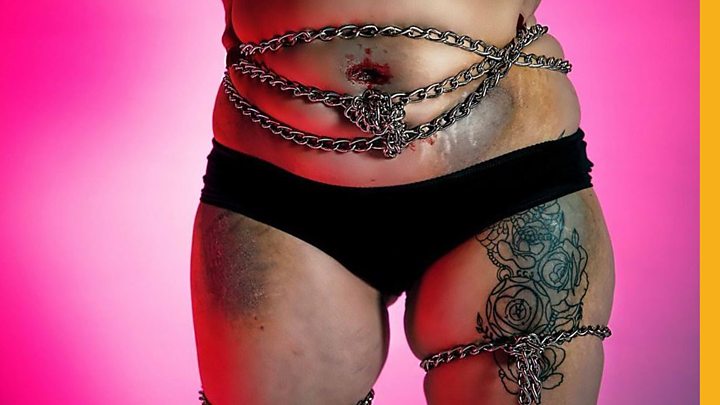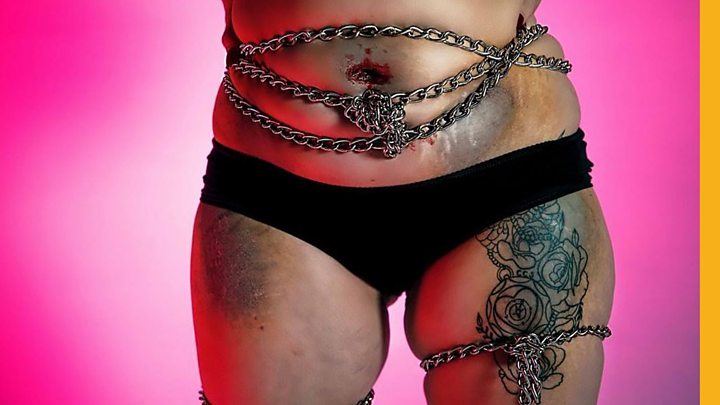Endometriosis: Thousands share devastating impact of condition
Thousands of women have revealed to the BBC how endometriosis has affected their lives. …


Media playback is unsupported on your device
More than 13,500 women have taken part in BBC research revealing the devastating effect of endometriosis.
Half said they had had suicidal thoughts, and many said they rely on highly addictive painkillers.
Most also said endometriosis – involving painful periods – had badly affected their education, career and relationships.
MPs are to launch an inquiry into women’s experiences of endometriosis following the research.
Women with the condition answered questions on how the condition has affected them. The charity Endometriosis UK helped gather the responses.
The condition affects one in 10 women and, as well as extremely heavy periods, can cause debilitating pain and sometimes infertility.
Bethany Willis, who lives in Essex, was one of those who took part in the research. She began having endometriosis symptoms aged just nine.
She knew what it was because her mum and grandmother also have the condition.
Now 19, Bethany says: “The pain is like barbed wire wrapped around your insides and someone’s pulling it while at the same time an animal is trying to eat its way through you.”
At one point she was in so much pain that she took an overdose.
“I texted my boyfriend and said goodbye. I was ready to end my life there and then because of the pain.”
She was finally diagnosed this summer following surgery and – though still in daily pain – she is managing to cope.
“My mind is clearer and I have more energy, but the years of not being treated mean I’ve had to drop out of veterinary school and my dream career,” she said.
Anna Turley MP, a member of the All-Party Parliamentary Group for Endometriosis which will carry out the inquiry, said: “It wasn’t until I was hospitalised and had the diagnosis that I realised how little attention endometriosis receives, how limited research funding is, and how many women are misdiagnosed.”
She said the data gave “millions of affected women a voice” and the APPG would be calling on the government to act.
Tayla Marshall, 24, from Northamptonshire, is one of those who relies on pain relief to cope with her symptoms.
She has been through multiple operations and two chemically-induced menopauses and she is now addicted to strong opioid medication.
“I worry every day about my opioid intake. I take 50ml of morphine sulfate, Fentanyl patches, Naproxen and 30mg of amitriptyline and although I’m not addicted in my mind, my body is physically dependant on this now.
“If I went a day without it, I would start to experience nasty withdrawal symptoms.”
Because her condition is so severe, Tayla is considering having a hysterectomy when she’s 30.
“I have six years to try for a family,” she said.
“But my last relationship ended due to the impact of endometriosis. I wasn’t able to be intimate with my partner very often, unless I was dosed up on medication.
“I am also in a position where I have reduced chances of falling pregnant naturally and carrying a baby.
“I have sort of managed to get my head around the idea of not having children but it breaks my heart every day.”
What is endometriosis?
- It is where tissue like that in the lining of the womb grows elsewhere in the body – often around the reproductive organs, bowel and bladder.
- Like the womb lining, the tissue builds up and bleeds every month, but with no way to escape the body, the blood is trapped, leading to inflammation, pain and formation of scar tissue
- For some women there are no symptoms, but for others it is debilitating and can cause• chronic pelvic pain, painful sex, painful bowel and bladder movements, fatigue and difficulties getting pregnant
- There is no cure, but treatments can reduce symptoms
- They include hormone treatment, pain relief and surgery – including hysterectomy
- In the UK it takes an average of 7.5 years to be diagnosed
Emma Cox, CEO of the charity Endometriosis UK, which helped gather the women’s testimonies, said: “It cannot be overstated the devastating impact this condition is clearly having on people’s physical and mental health.
“Without investment in research, a reduction in diagnosis time – which averages at a shocking 7.5 years – and better access to pain management, women will continue to face huge barriers in accessing the right treatment at the right time.”
Some women choose to undergo a hysterectomy and early menopause in a bid to stop their symptoms.
Michelle Middleton, 42, from West Yorkshire, recently underwent the operation to remove her ovaries, womb, fallopian tubes and cervix.
She says it is her last hope: “I just want rid of everything,” she said.
But she added: “The risk is that I’m no better and that there’s damage and it gets worse but you have to have hope.”

